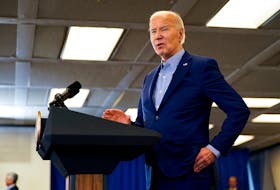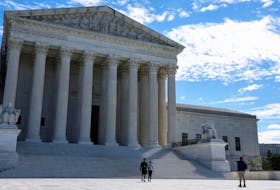The Anglican Church has added its blessing to a group consolidated in opposition to hydraulic fracking in Nova Scotia.
“In order to be a Christian, you get baptized,” said Ron Cutler, the archbishop of the Anglican Diocese of Nova Scotia and Prince Edward Island. “One of our baptismal vows is ‘will you strive to safeguard the integrity of God’s creation and respect, sustain and renew the life of the Earth?’ We figure it is the duty of any member of the church to be engaged in some way or another in environmental sustainability. We don’t see fracking as playing a role in environmental sustainability.”
The church is one of 40 organizations and businesses that are jointly calling for Nova Scotia’s 2014 fracking moratorium to remain in place.
The group sent off a letter to the premier and Energy Minister Geoff MacLellan on Wednesday urging the continuation of a ban on the practice of injecting large quantities of water and chemicals at high pressure into underground rock to fracture the rock formation and facilitate the flow of natural gas or oil.
The joint letter was drafted in response to MacLellan’s statement shortly after an onshore petroleum atlas for Nova Scotia, released in January, identified 4.3 trillion cubic feet of shale gas under the province, the major share of it in the Windsor-Kennetcook and Cumberland sub-basins. MacLellan said at the time he was “looking forward to the discussion” on fracking.
The minister said Wednesday that the moratorium is not in jeopardy.
“The status quo is still in place, the moratorium on fracking still exists in Nova Scotia,” MacLellan said during a break from a lengthy legislature session. “We haven’t finalized the regulations for that fracking ban. There is no suggestionwhatsoever that the government is moving off of that position. We made the commitment that we would conduct the work around
an onshore atlas (to show) where the resource potentially could be and what potential quantities there could be and that we would make that public to the private sector and all Nova Scotians.”
MacLellan said the opportunity was provided for discussions around the issue of fracking and about how the fracking procedures might have changed in the past four years.
“We don’t have to be afraid of any new information, if any does exist, but at this point, the ban is still in place and nothing has changed.”
The 40 signatory groups that represent a wide cross-section of the population from faith, health, forestry and environmental organizations, farmers, First Nations peoples and small businesses, said the Wednesday letter is their “contribution to the (fracking) discussion.”
“There is no reason for Nova Scotia to reconsider the ban on fracking,” Barb Harris of the Environmental Health Association of Nova Scotia said in a release that accompanied the letter.
Cutler agrees that fracking should not be revisited.
“There are 92 Anglican parishes all over P.E.I., and Nova Scotia and we have networks that gather people together for specific interests,” the bishop said. “The environmental network is the largest network we have. We have more people involved in one way or another trying to figure out what environmental sustainability looks like for the church and for their life and community than anything else we do.”
Marian Lucas-Jefferies, pastor for the Collieries parish in Cape Breton, chairs the diocesan environment network. She said the local church, the Canadian church and the international Anglican church are committed to caring for creation, for the planet and all things in it.
“We believe that in the Bible we are called to do that, particularly in Genesis where we are called to be stewards of the Earth, we’re called to be engaged in these issues,” Lucas-Jefferies said. “It can be anything from recycling, practising the three Rs, to making a very public statement about our concern for climate change or issues like fracking. Fracking is something that greatly concerns the church.”
The church and its leaders address those concerns from the pulpit, through visible year-long actitivities and with behind-thescenes committee work, she said.
“Locally, we have a lot of parishes that will . . . create community gardens or be partners in acommunity garden, promote recycling programs, promote energy efficiciency in buildings, do the things we can to care for this planet as well as develop partnerships with other organizations within Nova Scotia and P.E.I. who also care for the planet, secular organizations that share the same goals.”
The concerns delineated in the letter to the minister and premier include risks to groundwater, human and wildlife health, soil and air quality and the problem of taking farmland out of production to facilitate onshore petroleum leases.
Still, Guysborough County council and Progressive Conservative leadership candidate John Lohr have voiced their support for ending the fracking ban.
MacLellan said such pressures, including the potential revenues from extracting shale gas, have not swayed government at all.
“Quite frankly, two letters from one municipality and one particular leadership candidate doesn’t constitute a social licence or a change in public direction,” MacLellan said. “We were very confident that despite some of the criticism that we did the right thing based on the feedback and the direction given by Nova Scotians. The onshore atlas was a way to stimulate the conversation to let people know what the resource could potentially look like.”
MacLellan said the Guysborough County and Lohr letters were the only correspondence received in favour of lifting the moratorium and that more people responded to advise maintaining the ban.
The joint anti-fracking letter urged government to “stop all further investigation of the potential development of shale gas, tight sands, and coal bed methane in the province.”









